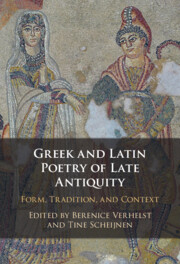Book contents
- Greek and Latin Poetry of Late Antiquity
- Greek and Latin Poetry of Late Antiquity
- Copyright page
- Contents
- Figures
- Contributors
- Introduction
- Part 1 A ‘Late’ Perspective on the Literary Tradition
- Chapter 1 Rivalling Song Contests and Alternative Typhonomachies in Ovid and Nonnus
- Chapter 2 Greek and Roman Epigrammatists in the Later Imperial Period
- Chapter 3 Allusion and Referentiality in Late Antique Epic
- Chapter 4 Speaking from the Margins
- Part 2 Late Antique ‘Genres’ and ‘Genre’ in Late Antiquity
- Part 3 The Context of Late Antiquity
- Bibliography
- General Subject Index
- Index Locorum
Chapter 3 - Allusion and Referentiality in Late Antique Epic
from Part 1 - A ‘Late’ Perspective on the Literary Tradition
Published online by Cambridge University Press: 16 June 2022
- Greek and Latin Poetry of Late Antiquity
- Greek and Latin Poetry of Late Antiquity
- Copyright page
- Contents
- Figures
- Contributors
- Introduction
- Part 1 A ‘Late’ Perspective on the Literary Tradition
- Chapter 1 Rivalling Song Contests and Alternative Typhonomachies in Ovid and Nonnus
- Chapter 2 Greek and Roman Epigrammatists in the Later Imperial Period
- Chapter 3 Allusion and Referentiality in Late Antique Epic
- Chapter 4 Speaking from the Margins
- Part 2 Late Antique ‘Genres’ and ‘Genre’ in Late Antiquity
- Part 3 The Context of Late Antiquity
- Bibliography
- General Subject Index
- Index Locorum
Summary
This chapter discusses modern trends in the study of late antique Latin poetry, namely the aesthetics of the jeweled style and especially the scholarly discourse on ‘nonreferentiality’ in allusion, and seeks to apply the concepts underlying this scholarship to late antique Greek epic, in particular to Triphiodorus and Quintus of Smyrna. As a case study and the focus of the chapter, allusions to Apollonius’ Argonautica, previously noted but undiscussed in scholarship on Triphiodorus, are discussed at length. The chapter ends with a re-examination of the in-proem in Book 12 of Quintus’ Posthomerica, and argues, in a nuancing of recent scholarship, that the passage’s much-discussed allusion to Callimachus can be read as ultimately ‘nonreferential’ in function.
Keywords
- Type
- Chapter
- Information
- Greek and Latin Poetry of Late AntiquityForm, Tradition, and Context, pp. 51 - 68Publisher: Cambridge University PressPrint publication year: 2022

